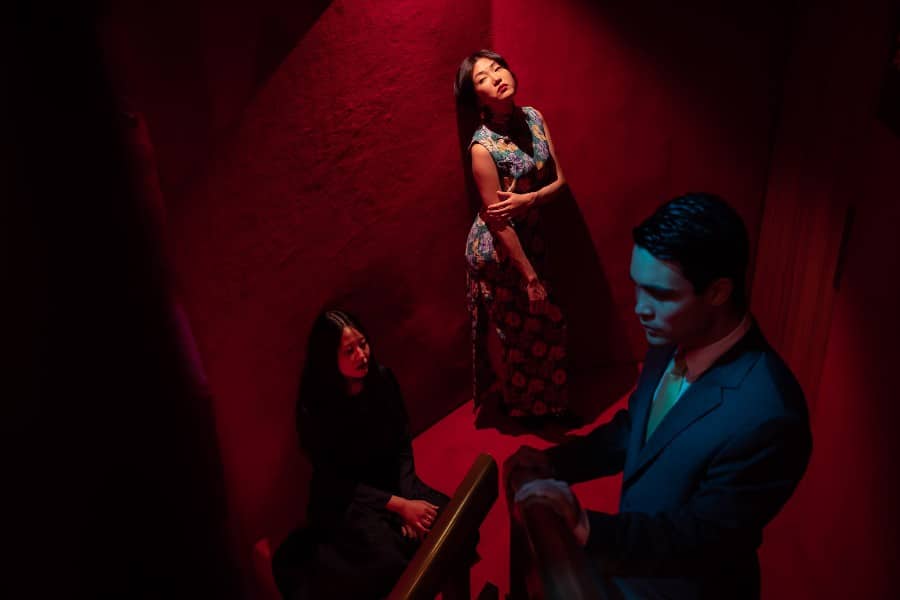
In the year 2000, Hong Kong film director Wong Kar-Wai released his best-known masterpiece, In The Mood For Love.
At that time, Hong Kong was a recent memory in the young mind of vocalist, producer and multi-disciplinary artist Rainbow Chan. "My family and I had just migrated to Australia in 1996 when Wong was making his iconic trilogy," she explains. "The two events collide in quasi-spiritual ways."
From her early impressions ("Wong Kar-Wai’s name was often used by my parents as a shortcut for anything 'arty'") Wong's work stayed with Chan - influencing her musical output and visual identity.
So when the Sydney Opera House approached Rainbow Chan - along with friends and collaborators musician Marcus Whale and performance artist Eugene Choi - to create a digitally streamed production in celebration of In the Mood for Love, it made bittersweet sense.
"This year is the 20th anniversary of In the Mood for Love. What a strange year to mark it," Chan says. "Considering the film is about distance, longing and the inability to act on desire, this project seemed like a perfect confluence of our personal histories and the current global moment living in a pandemic."
In the Mood, A Love Letter to Wong Kar-Wai and Hong Kong is streaming live from the Sydney Opera House's Joan Sutherland Stage this Saturday September 26, as part of its weekly digital program, From Our House to Yours.
In three words, Chan describes the the production as: "But not touch."
Intrigued? Read on and tune in, for free, this Saturday from 9pm.
How did In the Mood, A Love Letter to Wong Kar-Wai and Hong Kong come to be?
This project was first proposed to us by the Sydney Opera House and then developed in a collaborative manner. By "us" I mean Marcus Whale, Eugene Choi and myself. We’re great friends and have seen each others’ hearts break over and over again throughout our 20s. We also have a history of collaboration across music and live performance ...
When did you first come across Wong Kar-Wai’s work? Do you remember your first impressions?
Wong Kar-Wai’s name was often used by my parents as a shortcut for anything 'arty', usually to refer to something which looked amazing but difficult to understand. That’s probably my first impressions of Wong’s works as a kid. Obviously, I’ve developed my own interpretations of his works since. His film Chungking Express is my all time favourite.
How has it inspired you?
I love how Wong Kar-Wai plays with the themes of nostalgia and disappearance in impressionistic ways such as his use of saturated colours and improvised dialogue. These elements have found their way into my music, video clips and visual identity in general. If you watch my video clip for the single Oblivion taken from my last album Pillar, you will notice stylistic similarities. Plus, the clip was filmed in Hong Kong which made it extra sentimental for me.
How do you feel being a Hong Kong diasporic person in 2020?
I saw photographic series of Hong Kong streetscapes which focused on the image of greenery growing through cracked concrete. That probably sums it up.
How would you describe the production in three words?
"But not touch."
What has been most important to you, in creating In the Mood?
The film unfolds in a slow and fragmentary manner - more like cyclical vignettes rather following a linear storyline. We’re really leaning into that in this production by recreating abstracted moments from the film through costume, minimal sets, new original music by Marcus and myself, and Eugene's poignant narration. You could say that we’ve distilled 'essences' from the film and reimagined them for the SOH’s digital stage. I think as our performance isn’t a literal recreation of the film, it will carve out a special space for the audience to embed their own meanings into it. The Chinese name of the film 'The Age of blossoms' is an idiom which can mean 'the golden years' or one’s greatest love. We hope to conjure the tensions between that romantic fantasy and the reality of heartbreak.
This show evokes desire. What are you yearning for?
To stop and smell the roses.



